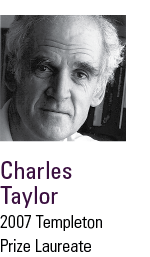

What role does spiritual thinking have in the 21st century?
 harles Taylor, Professor Emeritus of Philosophy at McGill University, argues that problems such as violence and bigotry can only be solved by considering both their secular and spiritual dimensions. Through examination of questions such as “What role does spiritual thinking have in the 21st century?”, Taylor contends that depending entirely on secularized viewpoints only leads to fragmented, faulty results, obscuring crucial insights for a global community increasingly exposed to clashes of culture, morality, nationalities, and religions.
harles Taylor, Professor Emeritus of Philosophy at McGill University, argues that problems such as violence and bigotry can only be solved by considering both their secular and spiritual dimensions. Through examination of questions such as “What role does spiritual thinking have in the 21st century?”, Taylor contends that depending entirely on secularized viewpoints only leads to fragmented, faulty results, obscuring crucial insights for a global community increasingly exposed to clashes of culture, morality, nationalities, and religions.

![]() Taylor has long objected to what many social scientists take for granted, namely that the elevation of rationality in the Enlightenment has turned such notions as morality and spirituality into quaint anachronisms. That narrow, reductive sociological approach he argues, cannot provide a full account of how and why humans strive for meaning.
Taylor has long objected to what many social scientists take for granted, namely that the elevation of rationality in the Enlightenment has turned such notions as morality and spirituality into quaint anachronisms. That narrow, reductive sociological approach he argues, cannot provide a full account of how and why humans strive for meaning.
![]() Taylor is the author of more than a dozen books and scores of published essays and has lectured extensively. He holds a bachelor of arts from McGill and Balliol College at University of Oxford, as well as a masters and doctorate (D.Phil.) from Oxford. Growing up in a bi-lingual Catholic home in Montréal, Quebec, where language is a political touchstone, spurred an early interest in matters of identity, society and the potential value of thought that runs against the common grain. Though his first degree was in history, a Rhodes Scholarship led him to study philosophy at Oxford, where he encountered what he describes as “an unstructured hostility” to religious belief. In reaction, he began to question the so-called “objective” approaches of psychology, social science, linguistics, history, and other human sciences.
Taylor is the author of more than a dozen books and scores of published essays and has lectured extensively. He holds a bachelor of arts from McGill and Balliol College at University of Oxford, as well as a masters and doctorate (D.Phil.) from Oxford. Growing up in a bi-lingual Catholic home in Montréal, Quebec, where language is a political touchstone, spurred an early interest in matters of identity, society and the potential value of thought that runs against the common grain. Though his first degree was in history, a Rhodes Scholarship led him to study philosophy at Oxford, where he encountered what he describes as “an unstructured hostility” to religious belief. In reaction, he began to question the so-called “objective” approaches of psychology, social science, linguistics, history, and other human sciences.
![]() Taylor’s doctoral dissertation, The Explanation of Behaviour (1964), offered a critique of psychological behaviorism. He went on to write about Hegel, who pioneered contemplation on notions of modernity, in Hegel (1975) and Hegel and Modern Society (1979). Taylor delivered the Gifford Lectures, entitled “Living in a Secular Age,” at the University of Edinburgh in 1998-99. Published in three volumes, the lectures offered a detailed analysis of the movement away from spirituality in favor of so-called objective reasoning. The final volume, A Secular Age, a definitive examination of secularization and the modern world, was published in September 2007.
Taylor’s doctoral dissertation, The Explanation of Behaviour (1964), offered a critique of psychological behaviorism. He went on to write about Hegel, who pioneered contemplation on notions of modernity, in Hegel (1975) and Hegel and Modern Society (1979). Taylor delivered the Gifford Lectures, entitled “Living in a Secular Age,” at the University of Edinburgh in 1998-99. Published in three volumes, the lectures offered a detailed analysis of the movement away from spirituality in favor of so-called objective reasoning. The final volume, A Secular Age, a definitive examination of secularization and the modern world, was published in September 2007.